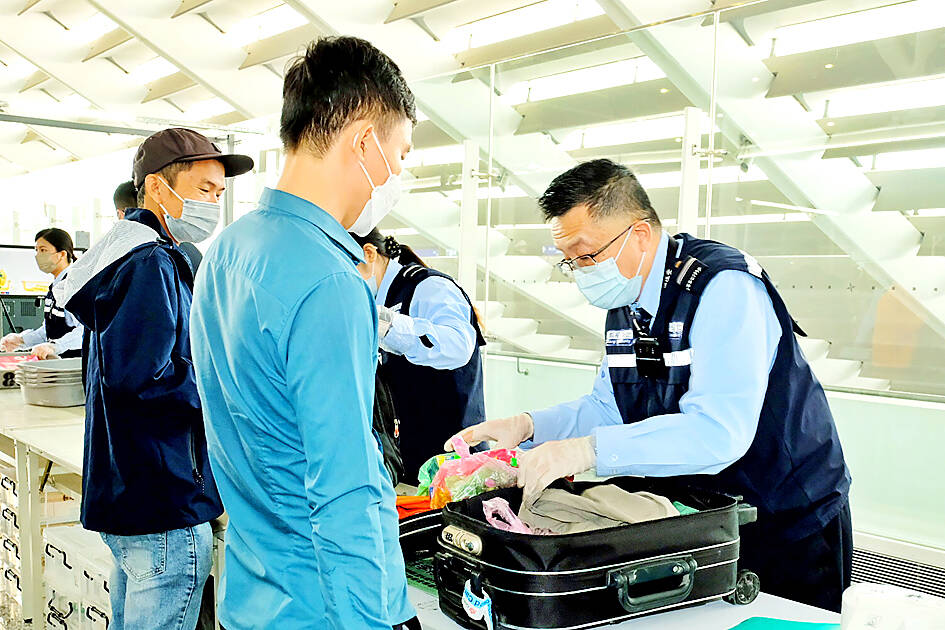A woman’s appeal against a NT$200,000 fine imposed for bringing meat products into Taiwan and failing to apply for import quarantine inspection last year was rejected, but she was given permission to pay the fine in installments, the Ministry of Justice’s Administrative Enforcement Agency said on Monday, while separately a Ministry of Agriculture official said people should not bring meat products from other countries into Taiwan due to the risk of African swine fever (ASF).
A retired teacher surnamed Yang (楊) was in July last year stopped at Taiwan Taoyuan International Airport trying to bring two long sushi rolls containing ham from Hong Kong and fined NT$200,000 by quarantine authorities due to the risk of ASF.
The case was transferred to the New Taipei Branch of the Administrative Enforcement Agency the following month.

Photo: CNA
Yang filed an appeal against the fine saying that she and her husband took their daughter who has panic attacks to Disneyland in Hong Kong last July in an attempt to help relieve stress, the agency said in a statement.
Yang said when at Hong Kong International Airport to take their flight to Taiwan, her daughter got hungry and Yang bought two long sushi rolls — one for her daughter to eat and one for relatives in Taiwan, it said.
Yang said she thought sushi rolls only had seaweed and vegetables, and did not know they contained meat until a sniffer dog detected it, according to the statement.
Yang’s appeal against the fine was rejected and she asked to pay it in monthly installments of NT$10,000.
The agency approved her request to pay in installments, taking into account Yang’s retired status and limited income.
As the Lunar New Year holiday approaches, the Ministry of Agriculture on Tuesday said people should not bring meat products from other countries into Taiwan due to the risk of ASF.
ASF is found in 79 countries and since the first reports of the virus in China in August 2018, there has been an increased concern over the spread of the disease in Asia, Animal and Plant Health Inspection Agency (APHIA) Deputy Director-General Hsu Jung-pin (徐榮彬) told a news conference on Tuesday.
Taiwan and Japan are the only ASF-free countries in East Asia, Hsu added.
From August 2018 to Jan. 15, of the 6,795 meat products tested, 639 came back positive for ASF, including 529, or 83 percent, from China, Hsu said.
The positive detection rate for the ASF virus reached a high of 9.89 percent among confiscated pork products from China, Hsu added.
ASF is a high-threat foreign animal disease that is highly transmissible and results in up to 100 percent mortality in swine.
Although the disease does not harm humans, it has the potential to hurt Taiwan’s pork industry, the APHIA said.

TRAFFIC SAFETY RULES: A positive result in a drug test would result in a two-year license suspension for the driver and vehicle, and a fine of up to NT$180,000 The Ministry of Transportation and Communications is to authorize police to conduct roadside saliva tests by the end of the year to deter people from driving while under the influence of narcotics, it said yesterday. The ministry last month unveiled a draft of amended regulations governing traffic safety rules and penalties, which included provisions empowering police to conduct mandatory saliva tests on drivers. While currently rules authorize police to use oral fluid testing kits for signs of drug use, they do not establish penalties for noncompliance or operating procedures for officers to follow, the ministry said. The proposed changes to the regulations require

The Executive Yuan yesterday announced that registration for a one-time universal NT$10,000 cash handout to help people in Taiwan survive US tariffs and inflation would start on Nov. 5, with payouts available as early as Nov. 12. Who is eligible for the handout? Registered Taiwanese nationals are eligible, including those born in Taiwan before April 30 next year with a birth certificate. Non-registered nationals with residence permits, foreign permanent residents and foreign spouses of Taiwanese citizens with residence permits also qualify for the handouts. For people who meet the eligibility requirements, but passed away between yesterday and April 30 next year, surviving family members

China Airlines Ltd (CAL) yesterday morning joined SkyTeam’s Aviation Challenge for the fourth time, operating a demonstration flight for “net zero carbon emissions” from Taiwan Taoyuan International Airport to Bangkok. The flight used sustainable aviation fuel (SAF) at a ratio of up to 40 percent, the highest proportion CAL has achieved to date, the nation’s largest carrier said. Since April, SAF has become available to Taiwanese international carriers at Taipei International Airport (Songshan airport), Kaohsiung International Airport and Taoyuan airport. In previous challenges, CAL operated “net zero carbon emission flights” to Singapore and Japan. At a ceremony at Taoyuan airport, China Airlines chief sustainability

‘ONE CHINA’: A statement that Berlin decides its own China policy did not seem to sit well with Beijing, which offered only one meeting with the German official German Minister for Foreign Affairs Johann Wadephul’s trip to China has been canceled, a spokesperson for his ministry said yesterday, amid rising tensions between the two nations, including over Taiwan. Wadephul had planned to address Chinese curbs on rare earths during his visit, but his comments about Berlin deciding on the “design” of its “one China” policy ahead of the trip appear to have rankled China. Asked about Wadephul’s comments, Chinese Ministry of Foreign Affairs spokesman Guo Jiakun (郭嘉昆) said the “one China principle” has “no room for any self-definition.” In the interview published on Thursday, Wadephul said he would urge China to